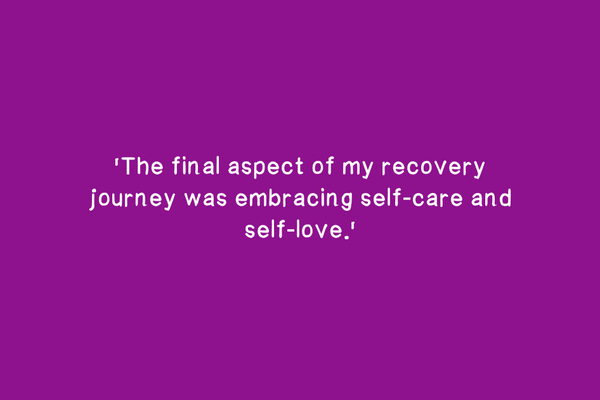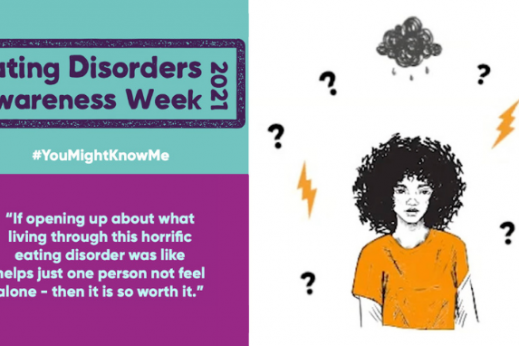Binge Eating Disorder is estimated to be the most common eating disorder. Despite this, we don’t actually hear much about binge eating and what this means.
Binge eating is something I struggled with for years, and it’s the eating disorder behaviour that makes me the most uncomfortable to talk about. Different to a session of overeating – which we all do from time to time – it is an all-consuming and painful behaviour that requires professional support.
Beat estimates that 1 in 50 people will experience binge eating in their lifetime. For eating disorder awareness week, Beat put a spotlight on this behaviour with their #YouMightKnowMe campaign, which encouraged people to talk about their experiences and reach out for help.
If you have been struggling with binge eating during the Covid-19 pandemic, you are not alone. Areas of the UK have reported a quadrupling in the amount of people needing eating disorder treatment. From keeping weekly supplies of food in the house, to staying inside with no distractions, to more time spent on social media, to stresses about health and money… The pandemic has been described as a ‘perfect storm’ for eating disorders.
The good news is that there is support out there. Beat has increased its support services to meet demand. From online support groups to helplines, you can reach out in a way that suits you best. And best of all, recovery is possible for everybody.
Here are some distractions and techniques that I have leant on over the years. If you are waiting for treatment or would like to assess your relationship with food during lockdown, you might find them useful.
Reach out for support.
This is always the first step for any mental health list. Whether talking to a loved one about how you’re feeling, reaching out to your GP or talking to Beat in one of their online support services, there is loads of support out there. Please don’t suffer alone.
List positives from each day.
This is a really simple technique that doesn’t have to be a time consuming. Every night I write a few sentences about the day and make sure to include some positives. This could be anything from getting outside for some fresh air, feeling more confident or enjoying a new TV show. It has been nice looking back over the months to find that there have actually been some positives during the pandemic, no matter how small.
Treat every day as a clean slate.
This is something I learnt during Cognitive Behavioural Therapy. No matter how yesterday went, no matter what behaviours happened, yesterday has gone and it’s time to start again. This has been incredibly comforting over the years and encourages you to treat yourself with kindness.
Plan and schedule in things to look forward to.
During lockdown, I’ve been trying to schedule in nice things no matter how small. This could be a zoom call with friends or family, a new film or book, or trying a new recipe. This has helped to keep the lockdown blues at bay and has been a very welcome distraction.
Recognise that you’re doing your best!
The pandemic has been difficult in so many ways. It’s not a normal situation for people to deal with and there’s no shame in struggling. Keep taking one day at a time and keep reaching out when things are hard.
Create a ‘new normal’.
The usual routine has been disrupted in numerous ways: no commute, no work, no school, changes in income, no weekends out. Non-food / exercise related habits can be useful for creating a different daily routine, e.g. reading an hour before bed, going to sleep at a similar time each day, calls with friends or family.
Read self-help books.
I’d always recommend reaching out to a professional first, but I’ve found that self-help books have been a helpful way to stay in an active state of recovery. Recently I bought Sarah Dosanjh’s book ‘I Can’t Stop Eating: How to break free from the cycle of bingeing’, which has been a great way to introduce new techniques into my routine and learn more about why bingeing develops.
Return to previous advice.
If you’ve had professional support for your eating problems before, you might find returning to these notes useful. An example of this is the ‘self-soothe box’. Simply make a list of activities that give you a sense of calm (your favourite album, a bath bomb, a book, nail kits, knitting – anything at all) and make a space in your room for it. Reach for this box whenever you need it. It may seem like a tiny thing, but it can make a difference over time.
Contributed by Charlie, Beat Ambassador
Unseen Struggles: Neurodivergent Women and Eating Disorders
9 November 2023Our supporter Chloe discusses the intersection between neurodivergence and eating disorders, sharing her experiences of BED
"I became an entirely different person"
2 March 2021Particularly with binge eating disorder, it’s so easy to get trapped in your own head and convince yourself that you are the problem and are unworthy, and this can be so, so dangerous.
Life is waiting for me, as it is for you
13 July 2020To this day, my relationship with food is a complex one, but I am very much of the belief that next year will be better, and the year after that will be even better.


